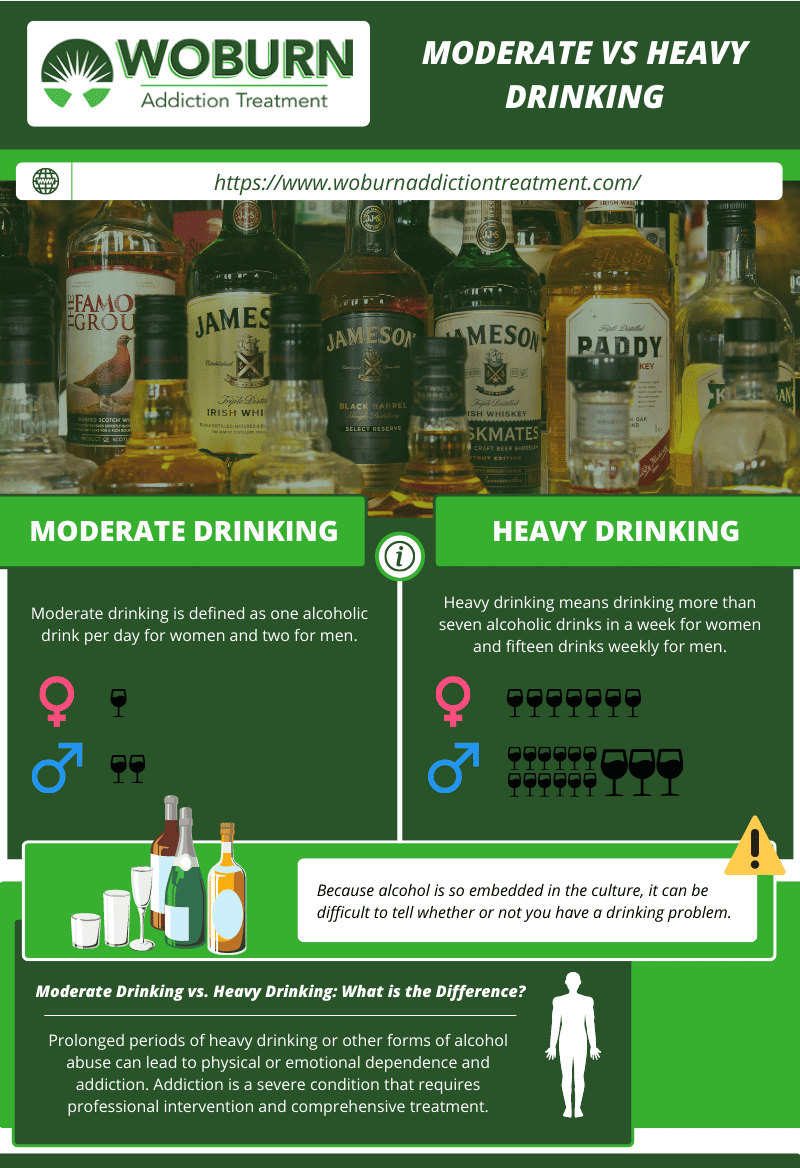Alcohol Detox and Drug Detox Massachusetts
Alcohol is common in many social occasions and celebrations in American culture. The majority of Americans report drinking alcohol from time to time. While many people can drink alcohol as part of a generally healthy lifestyle, 14.5 million adults in the United States live with an alcohol use disorder (AUD) that requires treatment.[1]
Because alcohol is so embedded in the culture, it can be difficult to tell whether or not you have a drinking problem. It’s essential to understand the difference between moderate drinking vs. heavy drinking and be aware of the signs you may need help to overcome alcohol abuse.
For more information about starting an alcoholism treatment program or for support during recovery, reach out to the Woburn Addiction Treatment specialists today.

What is Moderate Drinking?
The Centers for Disease Control and Prevention (CDC) provide guidance about moderate drinking. Moderate drinking is not believed to cause significant harm to your health and safety and can be part of a generally healthy lifestyle.
Moderate drinking is defined as one alcoholic drink per day for women and two for men. Men are allowed more because gender is believed to affect the metabolism of alcohol.
The CDC defines an alcoholic drink as:[2]
- 1.5 ounces of distilled spirits like vodka, rum, and whiskey
- 12 ounces of beer
- 5 ounces of wine
It’s important to remember that a standard drink in a bar or home may contain multiple “drinks,” according to the CDC’s guidelines. For example, a pint (16 ounces) of beer–the standard serving size– would count as more than one alcoholic drink
What is Heavy Drinking?
Heaving drinking means drinking more than the CDC recommends over the course of a week. For women, this means consuming more than seven alcoholic drinks in a week. For men, this is fifteen drinks weekly.
Drinking too much alcohol puts people at risk of certain health risks and increases their likelihood of being involved in an accident, illegal activity, or violent altercations.
It can be relatively easy for people who drink regularly to drink more than the CDC recommends. For example, a woman who has two glasses of wine each night would meet the CDC criteria for heavy drinking. A man who regularly has two pints of beer a day would also cross the line into heavy drinking.
Moderate and Heavy Drinking: What is the Difference?
The CDC’s guidelines on moderate drinking are meant to help people maintain a healthy relationship with alcohol and limit the hazards associated with excessive alcohol consumption. Health experts believe moderate drinking can be part of a generally healthy lifestyle and does not contribute to a higher risk for diseases like cancer, mental health disorders, liver disease, or heart disease.
Prolonged periods of heavy drinking or other forms of alcohol abuse can lead to physical or emotional dependence and addiction. Addiction is a severe condition that requires professional intervention and comprehensive treatment. It’s important to keep track of your drinking and be aware of the signs of alcohol abuse and alcohol use disorder (AUD). Monitor your alcohol use. Be honest with yourself and aware that a standard drink in a bar may contain more than one serving of alcohol.
Is it Time to Get Help for Your Drinking?
Certain risk factors, including genetic predisposition, mental illness, or physical conditions, can increase your likelihood of developing an addiction to alcohol or other substances.[3] But anyone can live with alcohol abuse. Using alcohol to self-medicate pain or emotional discomfort, binge drinking, or regularly drinking more than the CDC recommends are forms of alcohol abuse.
Understanding the signs of alcohol abuse can help you identify it, either in your own life or in a friend or loved one. Some of the symptoms of alcohol abuse include:
- Drinking more than you planned to
- Needing more alcohol to get the same effect
- Falling behind at work, school, or responsibilities at home
- Thinking or talking about alcohol constantly
- Isolating from friends and family
- Continuing to drink despite negative consequences
- Engaging in risky behavior, such as unprotected sex or driving under the influence
- Getting hurt or being involved in an accident while intoxicated
- Experiencing withdrawal symptoms when you stop drinking
These signs may indicate you need treatment to have a safe, complete detox from alcohol and learn the skills to avoid relapse for the rest of your life.
What is Alcohol Abuse Treatment Like?
Alcohol abuse and addiction are complex conditions. It’s not enough to treat the physical aspects of substance abuse. For meaningful, lifelong recovery, you must receive comprehensive treatment for the condition’s physical, emotional, and behavioral aspects.
Comprehensive treatment programs use a combination of evidence-based and holistic therapies to treat the whole person. These therapies include:
- Medically-supervised detox
- Individual counseling
- Group therapy
- Education
- Medications
- Mental health care
- Medical treatment
- Family therapy
- Holistic treatments like exercise therapy, art and music therapy, mindfulness, and nutrition counseling
After completing treatment, you will need to develop an aftercare plan to stay active and engaged in recovery and avoid relapse for life.

Get the Care You Need
Woburn Addiction Treatment is a leader in the addiction treatment field, with proven success in facilitating long-term recovery. Our team of top clinical & medical experts specializes in treating addiction coupled with mental illness, ensuring that each person receives individualized care. Call us – we’re available 24/day, 7 days/week.
Find Help for Alcohol Abuse and Alcoholism Today
Our alcohol rehab program in Woburn, MA combines proven therapeutic methods of healing with effective holistic modalities, making for integrated and highly individualized care that cannot be found anywhere else in the area. There are many things that set Woburn Addiction Treatment apart – for one, we offer an extremely unique set of therapeutic services, including weekly visits with therapy dogs, nutritional and physical therapy, and holistic treatment methods like yoga, mindfulness meditation, and acupuncture. The levels of clinical care we provide include a Day Treatment Program, Intensive Outpatient Treatment, and Outpatient Treatment. We will customize a long-term program of alcohol addiction treatment based on your individual needs, requirements, and treatment goals. To learn about our alcohol rehab center, call the Woburn Addiction Treatment specialists today. References:


